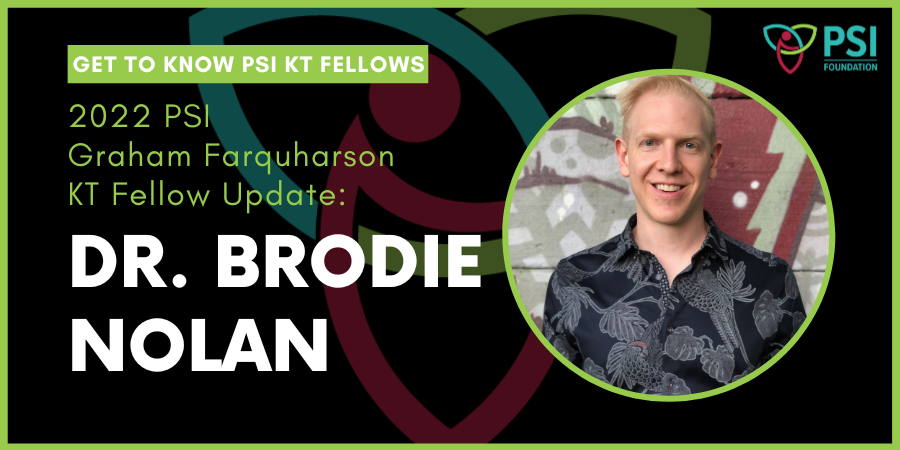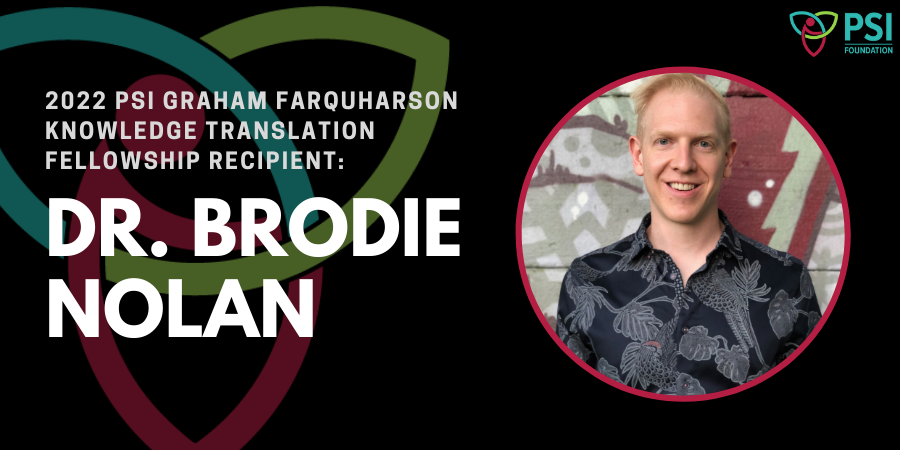Once our PSI Knowledge Translation (KT) Fellows take off from the starting line, they make strides as they move their knowledge translation activities and research program forward. As the finish line becomes clearer in their sight, we asked our fellows some questions to share their progress thus far, and what they look forward to in the remainder of their KT Fellowship.
What are some of your accomplishments from the KT Fellowship thus far?
FIRST60: Prehospital, Trauma, and Resuscitation Sciences
My biggest accomplishment of my KT Fellowship thus far was co-founding the FIRST60: Prehospital, Trauma, and Resuscitation Sciences research group (www.first60.ca). In May 2023, we held a strategic retreat at the Li Ka Shing Knowledge Institute, St. Michael’s Hospital, bringing together investigators and clinicians passionate about advancing prehospital care, trauma, and resuscitation science. This event united experts from various disciplines, including emergency medicine, surgery, transfusion, paramedicine, and nursing, alongside specialists in knowledge translation, quality improvement, education, and clinical epidemiology. Our mission focused on translating scientific research into practical bedside care, aiming to improve patient outcomes from the time of injury or illness through the acute resuscitation. Emphasizing the critical “golden hour” after injury, we named the group FIRST60 as a nod to the crucial first 60 minutes following injury or illness. As a group, since coming together in May 2023, we have had over 60 peer-reviewed publications and secured over $3.6 million dollars in research funding.
SWiFT Canada: Pioneering Prehospital Transfusion Trials in Canada
I am the Principal Investigator for Study of Whole blood in Frontline Trauma (SWiFT) Canada. Over the next year, this pilot study will assess prehospital whole blood versus component therapy (red blood cells + plasma) in traumatic hemorrhage for patients transported by air ambulance. Through this trial we have established a collaborative prehospital trauma network with the involvement of Ornge Air Ambulance, Canadian Blood Services and 6 lead trauma hospitals in Southern Ontario, marking a historic milestone as Canada’s inaugural prehospital transfusion clinical trial.
Driving Change in Prehospital Trauma Triage
Timely access to trauma centers is paramount in saving lives. However, for patients in Ontario, geographical constraints often impede prompt trauma care. I am actively investigating the effectiveness and efficiency of the Ontario Field Trauma Triage Standard, which guides paramedics in determining which patients should be directly transported to a trauma centre. Moreover, I am part of a working group that is advocating for revisions to the provincial Field Trauma Triage Standard to ensure alignment with the latest evidence-based practices. Additionally, I am spearheading the development of a prehospital transfusion prediction score, overseen by one of my PhD students Melissa O’Neill. This innovative score aims to identify patients experiencing massive bleeding in the prehospital setting, enabling paramedics to promptly alert the receiving trauma team for enhanced preparedness and improved patient outcomes.
Please describe any challenges/barriers that you have encountered thus far and what actions were/will be taken to resolve them?
Research funding for trauma and prehospital care is critically low, and this lack of financial support poses significant challenges to advancing the field. The absence of dedicated large funding bodies that specifically highlight injury or prehospital systems of care further exacerbates this problem. Unlike fields such as cancer or cardiovascular research, which benefit from substantial funding from large organizations, trauma and injury research does not have equivalent support. This is despite trauma and injury being a leading cause of death for young Canadians. This disparity in funding sources makes it difficult for researchers to secure the necessary financial resources to conduct comprehensive studies. The scarcity of large funding bodies focusing specifically on injury or prehospital care results in limited grant opportunities, hindering the development of innovative treatments and care systems.
Despite the lack of large funding bodies, smaller funding sources, such as Physician Services Incorporated, play a crucial role in supporting early career researchers. Funding through the PSI KT Fellowship has been instrumental in my early research career success. Such funding provides critical financial support that enables researchers to initiate projects, gather preliminary data, and build a foundation for larger studies. This initial support is a key stepping stone to securing more substantial grants in the future.
What are some items/deliverables that you look forward to coming to fruition in the remainder of your KT Fellowship?
Looking ahead to the remainder of my KT Fellowship a few of my deliverables are:
- Launching the SWiFT Canada Study
- Piloting a provincial prehospital transfusion registry, to evaluate and inform best practices in prehospital transfusion in Ontario
- Continuing to grow the footprint of the FIRST60 research group
What are some things that surprised you during your fellowship thus far?
During KT Fellowship, I encountered several unexpected insights and experiences that significantly shaped my perspective on trauma and injury research.
The Complexity of Interdisciplinary Trauma Collaboration
One of the most surprising aspects was the complexity and necessity of interdisciplinary collaboration. Trauma and injury research require the integration of various fields, including emergency medicine, surgery, paramedicine, nursing, hematology, epidemiology, public health, and even engineering. Coordinating efforts across these disciplines was challenging but crucial for developing comprehensive solutions to complex problems. Additionally, the data sources between prehospital and in-hospital are not well linked necessitating multiple data sharing agreements and substantial chart reviews to abstract essential data.
The Extent of Funding Challenges
I was aware of the funding challenges in trauma and injury research, but the extent of these challenges was more significant than I anticipated. Securing consistent funding was a continuous struggle, with many projects relying heavily on small, short-term grants. This reality underscored the importance of advocating for more substantial and stable funding sources.
The Impact of Technology and Data Analytics
The rapid advancement of technology and data analytics in trauma research was another unexpected discovery. Machine learning and big data analytics are becoming indispensable in analyzing large datasets and identifying patterns that can inform better clinical practices and policies. These technologies opened new avenues for research that I had not initially considered, with many interesting machine learning projects on the horizon.
The Importance of Mentorship and Networking
Lastly, the importance of mentorship and networking in advancing my research career was a pleasant surprise. Having access to experienced mentors provided invaluable guidance, support, and opportunities for collaboration. It also made the creation of the FIRST60 research group one of the most enjoyable aspects of my research career. Networking with peers and professionals in the field opened doors to new research possibilities and professional growth.


